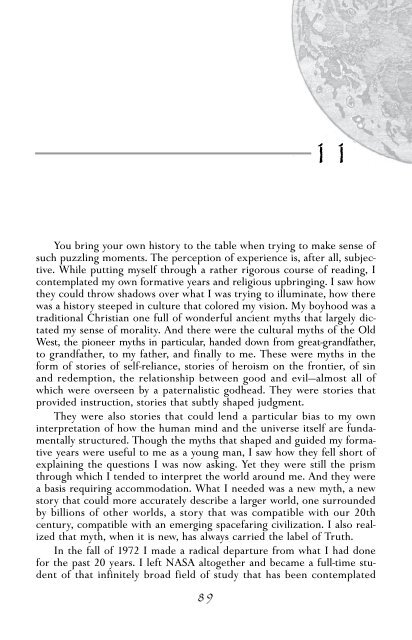edgar-mitchell
edgar-mitchell
edgar-mitchell
Create successful ePaper yourself
Turn your PDF publications into a flip-book with our unique Google optimized e-Paper software.
Sea of Sky 45<br />
Oftentimes, the seriousness of the points in debate only thinly disguised<br />
the fact that allocation of funds was the underlying issue. Unmanned advocates<br />
felt shorted both in resources and accolades, ignoring the political<br />
reality that it was the public’s personal identification with human adventure<br />
that made it possible to raise funds at all. The public was launched<br />
into outer space through the experiences of the astronaut. Through the<br />
astronauts, the public walked on other worlds. Were we to ask any of the<br />
men and women in the space program who have died in the line of duty, or<br />
who will yet surely do so, I believe they would offer simple answers: We<br />
should go forward for reasons that nourish the human spirit, simply because<br />
we are capable of doing so.<br />
My own thinking on human space exploration has deepened with the<br />
years, as research on intelligent machines and on the nature of consciousness<br />
has progressed. The differing viewpoints of astronauts, scientists, and others<br />
(funding issues aside) originate fundamentally from widely differing<br />
beliefs about the origin, meaning and destiny of life. Ultimately, our joint<br />
quest is to one day bring these questions to meaningful conclusions.<br />
During the era of the Apollo Program of lunar exploration, it was<br />
conventional wisdom in both scientific and theological circles that not<br />
only were we alone in this vast universe, but also that the speed-of-light<br />
limitation from Einstein’s theory of special relativity forever doomed us as<br />
a species to this middle-aged solar system on the fringes of the Milky Way<br />
galaxy. It is quite intriguing that a handful of scientists, the most prominent<br />
of whom were Frank Drake and Carl Sagan, were able to find the<br />
funds and government support to establish a radio astronomy project called<br />
the Search for Extraterrestrial Intelligence (SETI). Its objective was, and<br />
still is, to search the heavens for some coherent electromagnetic signal<br />
that would reveal the presence of an alien intelligence. This was established<br />
in spite of almost unanimous belief in the academic world of the<br />
period that life was such a freak accident of nature that it surely could not<br />
have occurred more than once. I was intrigued by SETI, for I had long<br />
questioned the dogma of our aloneness—it just wasn’t reasonable to me.<br />
Also, Sagan delivered a number of lectures to assist us in the preparation<br />
for lunar exploration. I admired his boldness on this ET matter.<br />
In the background, barely discernable above the noise of daily events,<br />
there had been persistent and serious claims beginning in the 1940s, coupled<br />
with adamant government denials, that extraterrestrial craft have been<br />
visiting Earth. I was much too busy with preparations for Apollo to be<br />
distracted by this controversy. During my operational years as a naval officer<br />
and aviator, I was well aware of the rules and procedures for reporting<br />
unidentified aerial sightings. Although I never had occasion to test the<br />
system by making a UFO report, I had heard stories circulating in the


